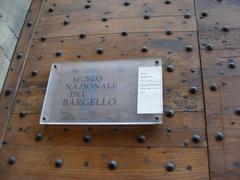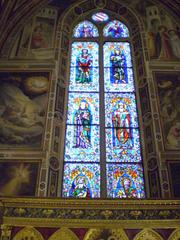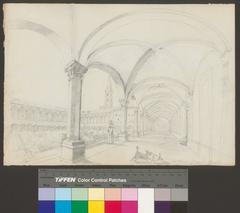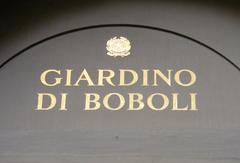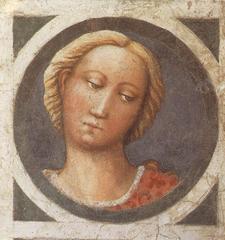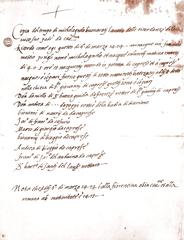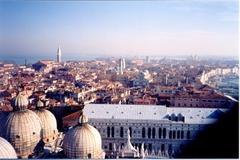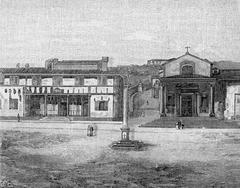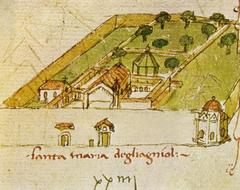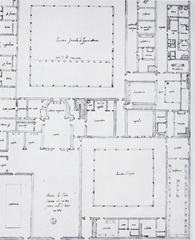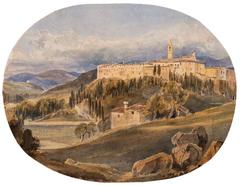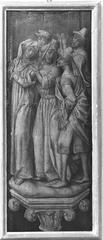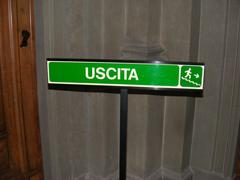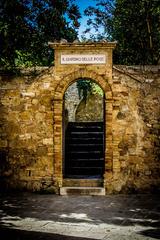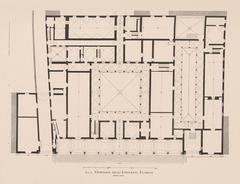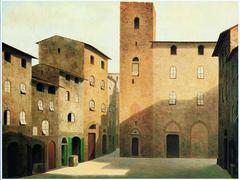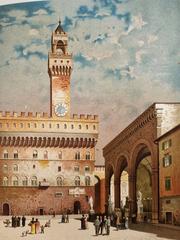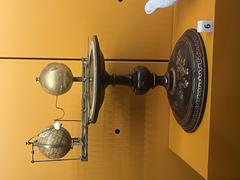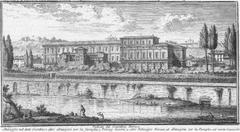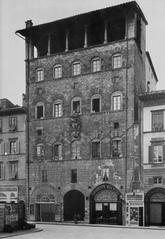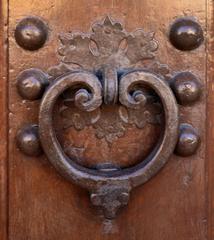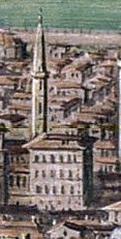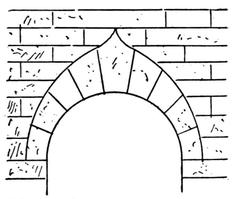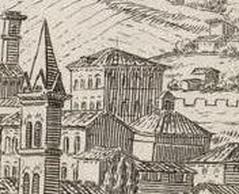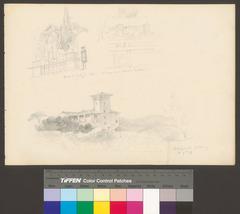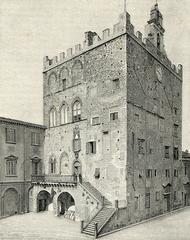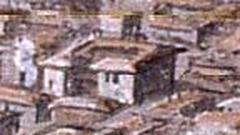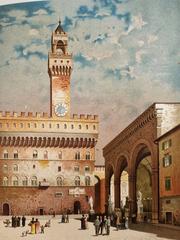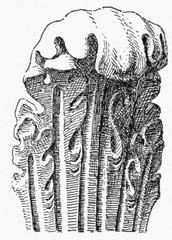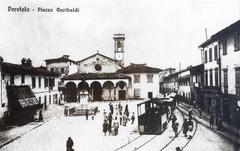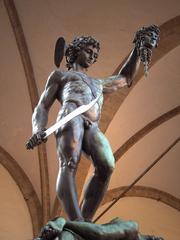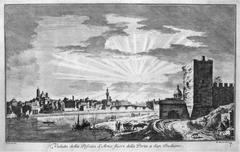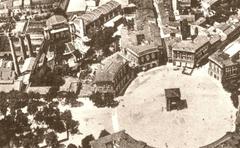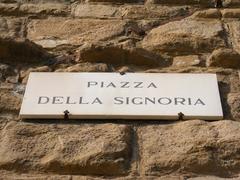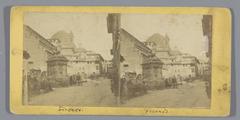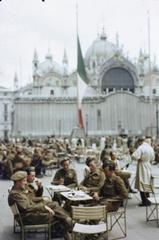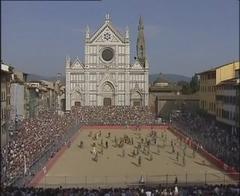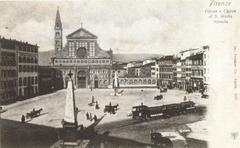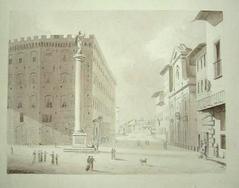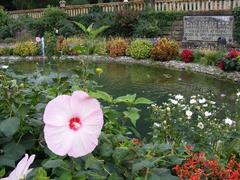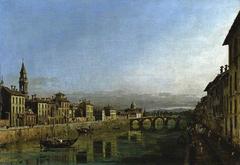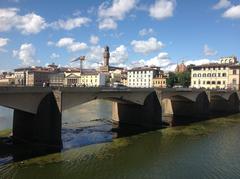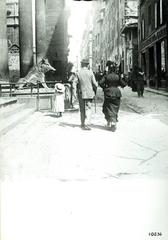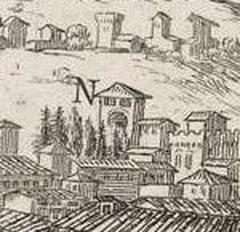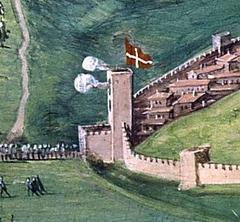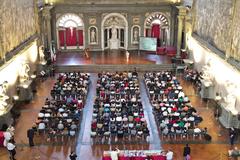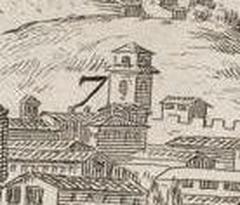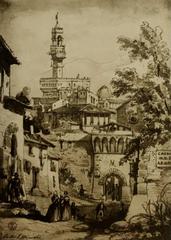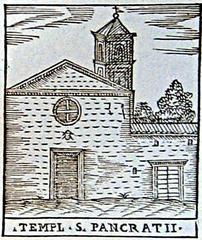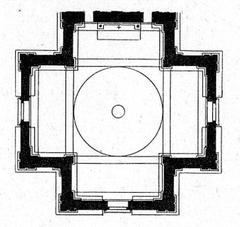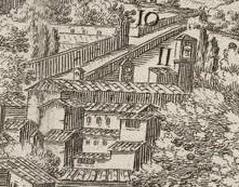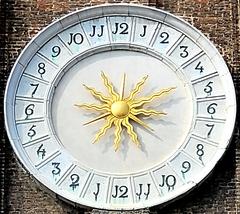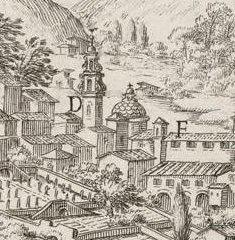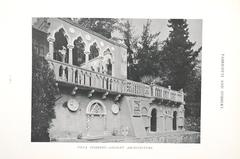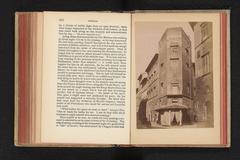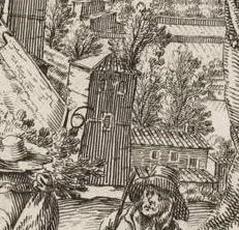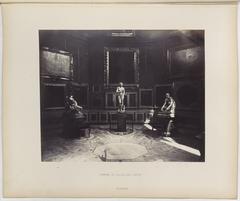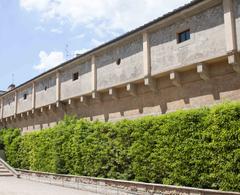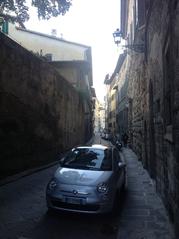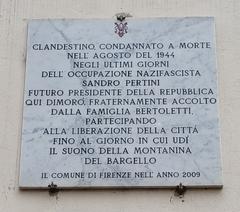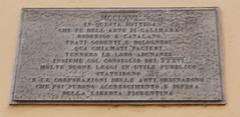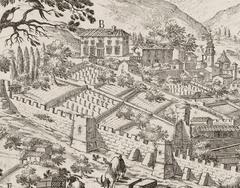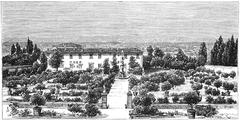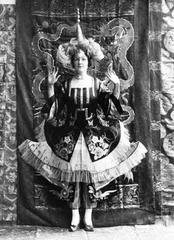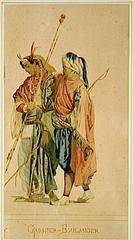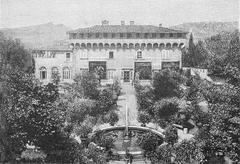Facoltà Teologica dell’Italia Centrale: Visiting Hours, Tickets, and Historical Sites in Florence
Date: 03/07/2025
Introduction
Nestled in Florence’s Oltrarno district, the Facoltà Teologica dell’Italia Centrale (FTIC) is a distinguished institution that bridges centuries of theological scholarship with the city’s rich cultural heritage. Originally founded in 1348 as the Studium Generale Florentinum under Pope Clement VI, the FTIC embodies Florence’s longstanding legacy as a hub of religious and intellectual inquiry—a tradition that flourished through the Renaissance and thrives today (firenzeconvegnoartesacra.it). Re-established in 1997, the FTIC now serves the ecclesiastical provinces of Tuscany and Central Italy, conferring degrees recognized by the Holy See and compliant with the Bologna Process (ftic.it).
The FTIC’s home in the restored 18th-century “Conventino” offers a unique blend of architectural elegance and modern educational facilities. Its setting in Oltrarno places it within easy reach of Florence’s most celebrated landmarks, including the Cathedral of Santa Maria del Fiore, Uffizi Gallery, and Ponte Vecchio (italia.it). This guide provides a detailed overview of the FTIC’s historical and academic significance, practical visitor information—such as hours, ticketing, and accessibility—and highlights the nearby cultural attractions that make the FTIC a must-visit for scholars, tourists, and travelers alike (ftic.it; teofir.it; issrtoscana.it).
Historical Overview
Medieval Origins: The Studium Generale Florentinum
The FTIC traces its roots to 1348, when Pope Clement VI established the Studium generale florentinum, Florence’s first university for advanced theological and philosophical studies. This marked the city’s emergence as a center for intellectual and spiritual life in the late Middle Ages (firenzeconvegnoartesacra.it).
Renaissance and Modern Legacy
Throughout the Renaissance, Florence became a crucible for theological and humanistic discourse. Theological faculties, often linked to religious orders and cathedral schools, fostered a tradition of scholarly rigor that shapes FTIC’s interdisciplinary mission today (ftic.it).
Re-establishment in the Contemporary Era
In 1997, the Congregation for Catholic Education officially re-established the FTIC, reinforcing its status as a modern center for theological formation in Tuscany and Central Italy (firenzeconvegnoartesacra.it).
Academic Mission and Excellence
The FTIC’s mission is to deepen theological reflection, foster interdisciplinary dialogue, and prepare graduates for both ecclesiastical and secular roles. Its faculty is actively involved in research, including institutes such as the Joseph Ratzinger/Benedict XVI International Chair and the Istituto di Ricerca in Teologia Sociale (ftic.it).
Academic Programs
The FTIC offers ecclesiastical degrees—Baccalaureate, Licentiate, and Doctorate in Theology—recognized by both the Holy See and the Italian Episcopal Conference (ftic.it). Its curriculum, structured in accordance with the Bologna Process, includes:
- A five-year philosophical-theological cycle (I Ciclo)
- Two-year Licentiate programs in Dogmatic or Biblical Theology (II Ciclo)
- Advanced research opportunities
Admission requires proficiency in Greek and Latin, with preparatory courses available (ftic.it). Notable faculty include Don Stefano Tarocchi (Pauline studies) and Serena Noceti (researchgate.net).
Research and Dialogue
The FTIC is a center for research and ecumenical engagement, hosting international conferences and programs such as the “Scuola di Alta Formazione in Ecumenismo” (academia.edu).
Visiting the Facoltà Teologica dell’Italia Centrale
Location and Access
The FTIC is located at Viale Ludovico Ariosto, 13, in Florence’s Oltrarno district (teofir.it). The area is famed for its artisan workshops, local eateries, and proximity to major sites like the Boboli Gardens and Basilica di Santo Spirito (florencetips.com).
Getting There
- By Train: Arrive at Santa Maria Novella station; a 20-minute walk or short taxi ride to FTIC.
- By Bus: ATAF buses stop near Viale Ludovico Ariosto.
- By Taxi: Readily available at transport hubs.
- By Car: Parking is limited; public garages are recommended for visitors.
Visiting Hours and Tickets
- General Access: Monday to Friday, 9:00 AM – 5:00 PM. Closed weekends.
- Admission: Free for general visits. Some special events may require advance registration or tickets (often free or nominally priced).
- Guided Tours: Offered during academic open days or special events. Advance booking is recommended.
Always check the FTIC website or teofir.it for the latest visitor information and event schedules.
Accessibility
The campus is wheelchair accessible, with accommodations available upon request. Contact the administration in advance to arrange assistance.
Visitor Guidelines
- ID: Bring valid photo identification for registration.
- Dress Code: Modest attire is expected.
- Etiquette: Maintain a respectful demeanor; observe quiet zones.
- Photography: Permitted in outdoor areas; indoor photography may require permission.
Campus and Architecture
The FTIC’s campus, the historic Conventino, is a restored 18th-century building combining traditional architecture with modern facilities:
- Exterior: Elegant façade, spacious internal courtyard, landscaped green spaces, and rare central Florence parking.
- Interior: Nine multimedia classrooms, a large Aula Magna for events, and a well-equipped theological library with extensive collections (toscanaoggi.it).
- Community: As of 2024, the FTIC hosts 274 students (including 65 international and 34 visiting scholars), fostering a diverse academic environment.
Notable Figures and Honors
In 2025, Cardinal Gualtiero Bassetti received an honorary doctorate from FTIC, underscoring its prestige. Professors such as Serena Noceti and Andrea Bigalli further contribute to its academic vibrancy (toscanaoggi.it; researchgate.net).
Cultural Impact and Local Significance
The FTIC’s presence invigorates Florence’s Oltrarno district, melding theological tradition with Renaissance humanism. Its graduates serve in varied roles, extending the faculty’s influence beyond the Church into education and public life (ftic.it).
Nearby Florence Historical Sites
Combine your FTIC visit with exploration of Florence’s renowned landmarks:
- Cathedral of Santa Maria del Fiore
- Uffizi Gallery
- Ponte Vecchio
- Piazza della Signoria
- Galleria dell’Accademia
- Basilica di Santa Croce
All are easily accessible from the FTIC campus (italia.it).
International Collaboration and Student Diversity
FTIC’s alignment with the Bologna Process and partnerships with institutions like the Istituto Universitario Sophia ensure a vibrant, international academic community (sophiauniversity.org).
Contribution to Theological Innovation
FTIC addresses contemporary issues—bioethics, social justice, and pluralism—through research and outreach, preparing graduates for leadership in both ecclesiastical and secular contexts (teologiaissr.chiesacattolica.it).
Facilities and Services
- Library: Specialized theological collection; access for registered users and visiting scholars by arrangement.
- Study Spaces: Modern classrooms, lecture halls, and conference rooms.
- Refreshments: Vending machines and coffee corners; nearby cafés offer Tuscan cuisine.
- Wi-Fi: Available for students and visitors.
Public Engagement and Continuing Education
Beyond degree programs, FTIC offers public lectures, workshops, and continuing education for clergy and laypersons, fostering theological literacy and dialogue (ftic.it).
Frequently Asked Questions (FAQ)
Q: What are the FTIC visiting hours?
A: Monday to Friday, 9:00 AM – 5:00 PM. Closed on weekends.
Q: Is there an entrance fee?
A: General admission is free; some events may require registration or tickets.
Q: Can tourists visit FTIC?
A: Yes, especially during public lectures or open days.
Q: Is the campus accessible?
A: Yes, with advance arrangement for those with mobility challenges.
Q: Are guided tours available?
A: Yes, by booking during special events or open days.
Q: What are nearby attractions?
A: Florence’s major historical sites, all within walking distance.
Practical Tips for Visitors
- Academic Calendar: Best to visit during the academic year (October–June).
- Florence Peak Seasons: April–June and September–October are ideal for combining cultural exploration with your FTIC visit.
- Language: Italian is primary; English assistance may be limited.
- Transport: Use public transport or walk; parking is scarce.
- Safety: Florence is generally safe, but stay alert in busy areas.
Conclusion
The Facoltà Teologica dell’Italia Centrale offers a singular blend of intellectual heritage, cultural richness, and architectural beauty in Florence’s historic heart. Whether attending a lecture, touring the library, or exploring the tranquil campus, visitors gain insight into the city’s spiritual and academic legacy.
For up-to-date visiting hours, events, and guided tours, consult the FTIC official website or teofir.it. Leverage resources like the Audiala app for guided tours and event notifications.
Stay Connected and Explore More
Sources and Further Reading
- Facoltà Teologica dell’Italia Centrale (FTIC) in Florence: History, Visiting Information, and Cultural Significance, 2025, Firenze Convegno Arte Sacra (firenzeconvegnoartesacra.it)
- Official FTIC Website, 2025, Facoltà Teologica dell’Italia Centrale (ftic.it)
- Academic and Cultural Significance of FTIC, 2025, FTIC Official Website and Associated Publications (ftic.it)
- The Campus and Architecture of the Facoltà Teologica Dell’Italia Centrale: Visitor Guide, Hours, and Highlights, 2024, Toscana Oggi (toscanaoggi.it)
- FTIC Visiting Hours, Tickets, and Visitor Guide | Florence Historical Sites, 2024, ISSR Toscana (issrtoscana.it)
- Florence Historic Center and Attractions, 2025, Italia.it (italia.it)
- Cardinal Gualtiero Bassetti Honorary Doctorate at FTIC, 2025, Toscana Oggi (toscanaoggi.it)
- Ecumenical Formation Program at FTIC, 2022-2023, Academia.edu (academia.edu)
- ResearchGate Profile of Serena Noceti, 2025 (researchgate.net)
- Florence Travel and Visitor Tips, 2024, FlorenceTips.com (florencetips.com)
